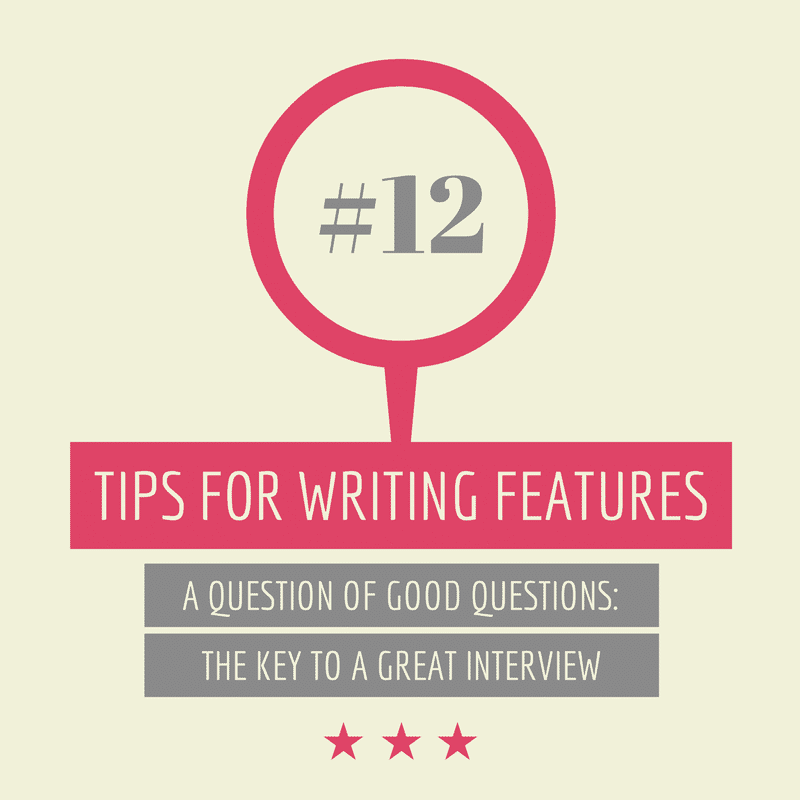Writing feature articles: A question of good questions

 I was talking to an editor friend of mine today who was gnashing her teeth over a story that had been submitted to her. It was a Q&A piece and it just wasn’t working.
I was talking to an editor friend of mine today who was gnashing her teeth over a story that had been submitted to her. It was a Q&A piece and it just wasn’t working.
“The answers are just not quite right,” she said to me.
“No,” I said to her. “The questions aren’t quite right.”
Whatever style of article you’re working on, be it general feature or Q&A, the key to getting the information you want, the great quotes you need, and the right angle for the piece is to ask the right questions. I have written before about interviews (specifically, one that went wrong).
About the importance of asking dumb questions.
About how to interview ‘real people’ for case studies.
And the importance of asking one final question when you find someone you think is a ‘good interview’.
So now I’m just going to lay out my four top tips for asking the right questions to get the great quotes you need.
1. Be prepared, but not too prepared
Some of the worst interviews I’ve ever conducted have been with a) people about whom I’d read everything ever written or b) experts in a subject that I’d researched to the point where I felt I knew as much as the experts. It makes for a boring interview and a boring interview will always bring boring quotes.
When I feel as though I’m learning something as I ask my questions, my interest is piqued, my questions are more spontaneous, and my eyes are bright and shiny. People respond to that. They want to tell me more. We get to cover areas of a subject that we might never have touched on if I’d left no room for them.
2. Listen for the little bell
Having said that, I always go into an interview with a prepared list of questions. I think long and hard about the brief, what I want to know about a subject and what the readers of the particular publication for which I’m writing the story will want to know. I ask those questions and I listen for the little bell that goes off in my head every single time I hear a quote I know I will use in the story. Sometimes it’s the quote on which I will build the story. When I hear that bell, I take that particular line of questioning just a bit further if I can.
3. Ask open-ended questions
Unless you’re after a definitive answer on whether Kevin Rudd will run for PM again (just as an example), don’t ask questions that are easily answered with a ‘yes’ or ‘no’. These leave you with nightmares when it comes to writing your story. What you want are nice, juicy sentences. A bit of waffle, even. Waffle can be edited. Boring answers can be dealt with by writing interesting words around them. But turning a ‘yes’ into a paragraph in your 1500 word story is not easy. Give yourself something to work with.
4. Actually, listen in general
It’s easy as a journalist to go into automatic mode when it comes to interviews, particularly phone interviews. You can be so busy trying to get the words down (if you type them) or so confident in the ability of your recording device to catch every word that you can forget to listen to what the interviewee is saying, zoning out into la-la land, planning the story in your head. Later, you’ll read over your notes and think ‘damn, why didn’t I ask that?’ because you will, without a doubt, have missed something.
When you really listen to the interview, you won’t miss the opportunity to ask the right questions.
As an interviewer, nothing gives me a bigger thrill than when someone says to me ‘those were great questions’. It means I’ve asked them something that’s made them think, and that will hopefully give me the material to make readers think. Win/win.
Allison Tait is a freelance writer with more than 20 years’ experience in magazines, newspapers and online publishing. During that time, her byline has been seen regularly in titles such as Madison, marie claire, CLEO, Cosmopolitan, Vogue Australia, Sunday Life, Spectrum (The Sydney Morning Herald), Essential (The Sydney Morning Herald), Weight Watchers, Australian Women’s Health, Voyeur,Qantas: The Australian Way and Elle, as well as House & Garden, Belle, Vogue Living, Australian Country Style and more.
Alison blogs at allisontait.com
Twitter: @altait
Facebook: facebook.com/AllisonTaitWriter
Browse posts by category
- Categories: Freelance and copywriting












